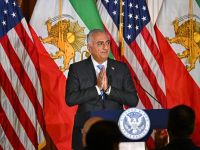Turkish academics expressed mixed views on the fine-tuning proposed by the International Monetary Fund to cool down the economy.
Professor Turkel Minibas of the University of Istanbul's economic department told the Anatolian news agency that Turkey's stabilization program was successful within itself, but that the economy was not improving.
"The government must fine-tune the economy because the foreign-trade leg of the program is missing, thus it is not possible to curb inflation by restraining demand. It should be supported by other fiscal policies," Minibas said.
He said academics hoped to see the stabilization program continue and also urged the private sector to increase productivity and investments that would boost production.
The IMF desk chief for Turkey, Carlo Cottarelli, made the suggestions during a recent visit.
Esfender Korkmaz of the university's Finance Faculty called for bridging budget deficits, which he regards as possible only through privatizing state economic enterprises. Korkmaz said the IMF was looking for revenue-increasing measures that would finance budget deficits.
"Extraordinary and temporary expenditures should be financed not through excessive taxes but by either one-off taxes or borrowing," Korkmaz told the news agency.
"One-off taxes have already been tried and borrowing has reached its limits. The only way is to privatize SEEs and secure long-term international loans." He argued against imposing new taxes, saying that that would affect economic stability.
"Only the private consumption tax is essential, not to increase revenues but for harmonization with the European Union," he added.
Associate Professor Kaya Ardic warned against raising interest rates for the sake of curbing domestic demand, a move he said would hurt budget balances and create inflationary pressures in the long term.
"The program is advancing in the right direction. The IMF and World Bank's continued support is the stopcock of the system," Ardic told the agency. "The program has an internal consistency leaning on monetary and exchange-rate policies.
"Fine-tuning would disrupt this consistency and other equilibriums. What must be done now is to press ahead with the program without any compromise and carry out structural reforms. –(Albawaba-MEBG)
© 2000 Mena Report (www.menareport.com)







